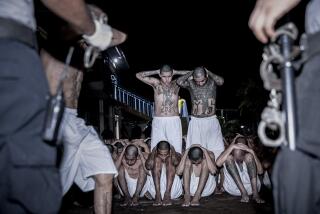S. African Detention of Children Decried
- Share via
JOHANNESBURG, South Africa — About 20,000 people, a third of them believed to be children, have been detained without charge since South Africa declared a national state of emergency four months ago, a civil rights monitoring group reported Tuesday.
Half of the detainees are still being held by the police, many in solitary confinement and some for more than three months, according to the Detainees’ Parents Support Committee.
Of those who have been released, hundreds reportedly have been barred under the emergency regulations from taking part in any political activities and have been placed under severe restrictions, sometimes amounting to house arrest, that curb their movements.
“There is no indication that the detentions are abating in any way,” Max Coleman, a committee spokesman, said. “Some days (at the committee’s offices) are nearly as hectic as those at the start of the emergency in June, with reports of dozens of new detentions around the country.
‘The Most to Fear’
“What is particularly worrying is the number of children, some as young as 10 and many in their early teens, who are being put into detention now,” Coleman said. “We are hearing of very large numbers of children being detained in several areas of the country. The authorities appear to believe they have the most to fear from these kids.”
Under the state of emergency declared June 12 by President Pieter W. Botha, the police and army have authority to detain any person indefinitely and without charge and with only limited recourse to the courts.
The emergency regulations, since upheld by the nation’s highest court, allow a detainee to be held in solitary confinement, to be placed on a severely reduced diet for disciplinary reasons and to be whipped by prison officers if he is “insolent or disrespectful,” “idle, careless or negligent,” if he “sings, whistles or makes unnecessary noise or causes unnecessary trouble or is a nuisance” or “causes discontent, agitation or insubordination among fellow detainees.”
Breakdown of Estimate
The committee’s estimate of 20,000 people detained over four months is based on two government lists of more than 9,300 detainees given to Parliament in late August; its own list of more than 7,000 detainees, 90% of whom were not on the government lists; an additional 2,000 believed detained since the government lists were issued, and 3,000 people, mostly striking workers, held at the start of the emergency.
“Our estimate is undoubtedly conservative,” Coleman said. “In the past, the government’s own figures have shown that our estimates have been under the official count by 25% to 30%.”
Based on an analysis of its list of known detainees, the committee estimates that fully 75% of those held belong to the United Democratic Front, a coalition of 650 anti-apartheid groups, and its affiliates. Thirty-five percent of those detained have been in the long-troubled eastern Cape province, mostly around Port Elizabeth, and about 30% in the Johannesburg area, with the balance scattered throughout the country, according to the committee.
Sole Authorized Source
There was no immediate comment from the government’s Bureau for Information, which has refused repeatedly to provide figures on the total number of people detained. Under the emergency regulations, the bureau is the sole authorized source of information on the country’s continuing civil unrest and police actions.
The bureau on Monday had credited the tough actions taken under the state of emergency with substantially reducing the level of political violence in the past two to three months.
According to the bureau, the number of reported unrest incidents had declined by 60% and is now at the lowest level in 18 months. The number of deaths by political violence declined from an average of more than five a day in May and June to less than one a day in September, the bureau, said.
More to Read
Sign up for Essential California
The most important California stories and recommendations in your inbox every morning.
You may occasionally receive promotional content from the Los Angeles Times.












